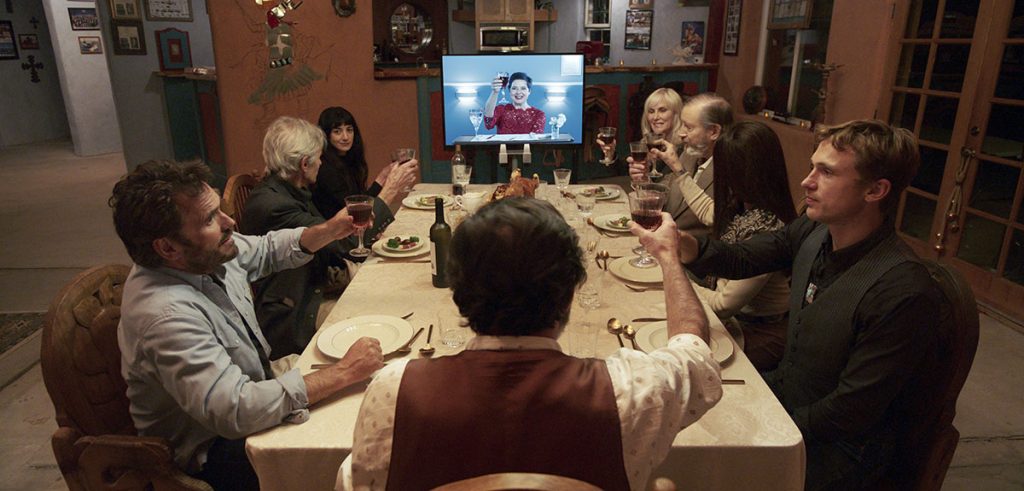Though Land of Dreams never quite manages to explore all the themes it approaches, a great lead performance and an important message on the immigrant experience make it worth a watch.
In the past few years, many films have been released that use the subject of dreams to approach complex themes like social and cultural identity, freedom and self-realisation and ultimately make a political statement in a satirical way. I am talking, for instance, of Kentucker Audley and Albert Birney’s Strawberry Mansion, screened at more than one festival this year and revolving around a dream auditor that spends his days recording and taxing people’s dreams—that come with their own set of subliminal messages and fried chicken adverts—and ultimately becomes obsessed with the dreams of a particularly eccentric woman. Similarly to Strawberry Mansion, Shirin Neshat (Women Without Men) and Shoja Azari’s (Windows) Land of Dreams is also set in a near future that looks a lot like the past, where the government has begun a program to record people’s dreams “for their security”, hiding a darker purpose that is ultimately revealed when the absurdity becomes impossible to ignore.
But unlike Strawberry Mansion, Land of Dreams also deals with many more themes, from immigration and war to religion, family and even art — which makes this ambitious project both incredibly fascinating and regrettably flawed, as, in the attempt to tackle all these important, timely issues, the film never quite makes up its mind on what it is exactly that it wants to say. The result is a captivating, promising film that never fails to have our attention — thanks to its genuinely compelling premise, a superb performance from lead Sheila Vand (Argo), and impressive camerawork that makes for an absorbing experience — but that ultimately leaves us confused as well as enlightened, making us wish the film had opted for a more straightforward approach to its captivating subject matter.
Land of Dreams revolves around an Iranian immigrant named Simin (Vand), who works for the United States Census Bureau and spends her days visiting people’s houses with the excuse of a questionnaire and ultimately getting them to share their most recent dreams with her, whose recordings are then stored into the government’s archives. But Simin does a lot more than what’s required of her, as she has found an outlet for her creativity that consists of her dressing up like her peculiar interviewees, recording herself as she impersonates them in Farsi, and sharing her videos on social media. In fact, we don’t know much else about Simin during Land of Dreams‘s first half: as the film immerses us into her world by immediately showing us her rituals and quirks, many are the questions in our mind.
What exactly will the government do with these people’s dreams? Who is our protagonist sharing her recordings with, and why? And, most of all, is Simin the victim of a controlling system or is she the villain? This is where the film is at its best: as we ponder all these questions and more, our attention never falters, and we are drawn into a central mystery that seems to become more complex and multilayered by the minute.

In fact, it’s not long till two more enigmatic characters appear and begin to follow our protagonist around: those figures are Mark (William Moseley, of The Royals), a hitchhiking, haiku-loving “handsome suitor” with the habit of showing up in random places and the ability to instantly fall in love with strangers, and Alan (Matt Dillon, of The House That Jack Built), a slightly creepy modern cowboy/bodyguard with a hilarious name, a knack for telling great jokes, and a “macho” attitude that’s not always well-received. But that’s not all: as the film continues, the absurdity grows, and Simin’s search for answers leads her to a series of mysterious places, from a “colony” of secretive Iranian revolutionaries who may or may not exist in the eyes of the American government to the house of a very loud woman (Isabella Rossellini) who seems to only exist behind a screen.
And then, of course, there’s the shady governmental organisation she works for, where mobile phones are made of thin air, electronic appliances morph into a variety of shapes and forms, and messages are deleted only to reappear at inconvenient times, until everything blurs into a dream and the very notion of reality is called into question.
Of course, behind these seemingly random events is the attempt to convey a meaningful, timely message that has to do with the immigrant experience in America — a message that is also personal for the directors, who are Iranian immigrants and have been living in the States since the 1970s, as well as the late Jean-Claude Carrière, the film’s co-writer, a French citizen who used to live in America. At this, Land of Dreams does, in part, succeed, as its fascinating protagonist, an Iranian citizen, is clearly torn between the two countries’ contrasting attitudes and beliefs, and her identity is shaped in more than one way by the very diverse experiences she has in the film.
Sheila Vand‘s performance has a lot to do with the film’s effective portrayal of its protagonist, as she successfully embodies a young woman who’s still looking for answers, often in the wrong places, and who ultimately learns how to be her own person and write her own narrative. There’s also a lot of symbolism in the film, from a series of characters who, in more than one way, embody the ideals of the American Dream, to the theme of memory, which is successfully woven into the narrative by means of Simin’s own past, and the pictures of specific moments from her childhood that have shaped her experience of life.
Less effective, however, are a series of twists that make the film’s main reveal a little less surprising, as well as several absurd scenes that are unfortunately not absurd enough to achieve comedic effect and not developed enough—no doubt, due to a lack of time in an already crowded narrative—to strengthen the film’s political message.
Though Land of Dreams is ultimately a missed opportunity, as it doesn’t entirely succeed in exploring the immigrant experience by means of political satire and absurdism, the film is still thought-provoking enough to be worth watching, aided by an excellent lead performance, impressive cinematography, and a series of unexpectedly hilarious moments (often involving Matt Dillon) that you won’t be able to forget.
Land of Dreams premiered at the 2021 Venice Film Festival on Thursday, September 2, 2021.

